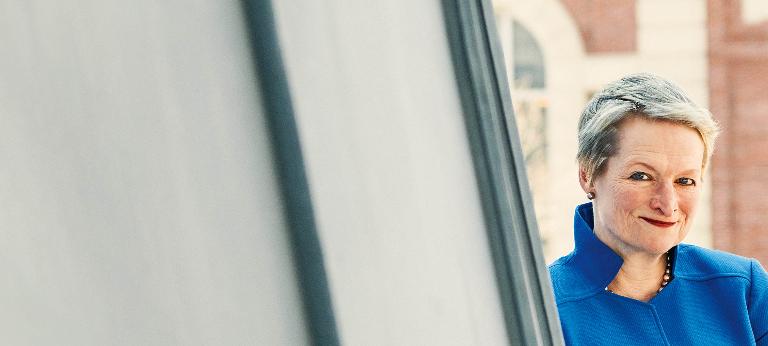Your path to tomorrow, today
![{[downloads[language].preview]}](https://www.rolandberger.com/publications/publication_image/tam_future_cover_en_download_preview.jpg)
The actions of the present lay the foundations for the future. What does this saying mean in turbulent times? Consider a mix of solidity and flexibility!



One of the world's top innovation experts, Rita Gunther McGrath has helped to define how to compete in a new world of transient advantages, how to spot inflection points and why you need to be able to adapt quickly – but not too quickly – to keep your company from being left behind.
For the past four decades, the majority of business strategists have defined their fundamental challenge as finding and then maintaining a competitive advantage. By and large, this model pioneered by Michael Porter worked fairly well. Porter, a professor at Harvard Business School and arguably the dominant business strategy theorist of the 1980s and 1990s, believed that the task of a business was to find and keep a competitive advantage over its rivals in a way that limited either the bargaining power of suppliers, the threat of new entrants, the threat of product substitutes, the bargaining power of buyers or its rivalry within the industry.
According to Rita Gunther McGrath, however, that's all changed now. In her book, "The End of Competitive Advantage: How to Keep Your Strategy Moving as Fast as Your Business", the Columbia Business School professor argues that in many industries, it's become much tougher to erect and then maintain barriers to entry. These days, McGrath writes, the entire corporate life cycle moves much more quickly. For the most part, you can only really achieve a transient advantage, and then you need to be ready to jump when you see what she calls an "inflection point" in your market that tells you it's time either to get in or to get out.

That all sounds smart, and it raised McGrath's reputation as one of the world's leading business thinkers even further. However, there was a glaring question at the center of it: How do you spot an inflection point? Cue her next book: "Seeing Around Corners: How to Spot Inflection Points in Business Before They Happen" gave McGrath the forum to explore how one goes about identifying that all-important inflection point. The book, which is scheduled to go on sale in September 2019, takes a closer look at the nuts and bolts of operating a business in an age where barriers to entry are in chronically short supply.
Perhaps McGrath's most important idea is that although market disruptions often seem to occur overnight, it's only because the company didn't notice the threat before. She clearly sets out her case: "One of the big ahas to me was that these things don't burst on your doorstep overnight. They take a long, long time and that gives you an opportunity ... to build the capability to act when the time is right," she says. "That can give you an advantage, even if it is a transient one."
She then enthusiastically explains how Ernest Hemingway gave her the inspiration for the working title of her book, "Seeing Around Corners – Gradually Then Suddenly". In his novel "The Sun Also Rises", she recalls with a smile how one of the characters answers the question of how he went bankrupt: "Two ways," she says, quoting the book; "Gradually, then suddenly." Typically, inflection points "bubble along for a long, long time before anybody bothers to pay attention, then they pick up steam, and then they are let loose in the world," McGrath explains.
This quality of inflection points creates two challenges for business leaders, according to McGrath. The first is figuring out how to monitor the weak signals that may indicate that something is about to change, which isn't always easy. If one looks at a traditional power generation company, for instance, every key performance indicator is about producing and distributing megawatts.
The structure seems solid, but McGrath asked herself a simple yet very revealing question: What happens when customers start installing solar panels and want to sell electricity back to the utility? "My point here is that the inflection point of a really radical change in the way in which we manage electricity would be easy to miss if your whole existence was focused on megawatt hours and how you generate them," she says. "That's why inflection points so often catch incumbents by surprise. It's not that they're bad people or that they're willfully ignorant. It's that they never had to think about it before. All of a sudden, this thing comes out of seemingly nowhere and shows up on your doorstep."
For starters, McGrath advocates rethinking who your competitors are or might be. "I think for many years we boxed ourselves in with this whole notion of where we are competing in industries. Instead, I'm recommending that we introduce a concept which I call 'competing in arenas,' where an arena is a pot of addressable resources, customers and other stakeholders with, to use Clayton Christensen 's phrase, 'jobs to be done,' and different ways that those jobs can get fulfilled by different kinds of players."
Once the threat or opportunity is identified, the second challenge is to decide how to react. And while Christensen's book "The Innovator's Dilemma" suggested that companies simply wouldn't take the risk of defending a disruption to their old business until it was too late, out of fear of cannibalizing themselves, McGrath argues that companies fail not only by responding with too little too late, but by doing too much too soon.
"They start throwing money at something that promises to be their salvation. But it's too early," McGrath says. One case in point: the overreaction of many traditional retailers to the internet in the mid-1990s, back when less than half the US was online. Many invested in expensive online stores before most consumers had managed to get online and before companies had built out the infrastructure needed to support online retail, such as the payment channels and bandwidth. Ultimately, those pioneers turned out to be right about the revolutionary nature of e-commerce, she says – "but only much later."
There is a much better way to handle it, she says, and that's through discovery-driven planning, a strategic method she first outlined with Ian C. MacMillan in a landmark 1995 "Harvard Business Review" article. "Set up some experiments, set up some options, test some hypotheses. Learn as you go. Don't throw all the money in the world at the thing. Build a very carefully constructed set of sensing mechanisms so that as the signals get stronger, you can have increased confidence that you're making the right decision without having spent the family jewels to do it."
"These things don't burst on your doorstep overnight. They take a long, long time and that gives you an opportunity."
It's not about predictions, McGrath says, but about looking for a factor that could change the constraints that you are accustomed to working in. "You have to go to the edges of your business, because the future is not going to present itself neatly at the corporate headquarters. These are things happening when some weird little entrepreneur in a garage somewhere says, 'Whoa, I got a breakthrough in solar energy conversion!' How do you know that 15 years later, this is going to be a massive issue for you? You don't. But if you have your sensors out and you're really looking, you have the chance to see it early."
When those signals eventually do get loud and close, the next challenge is handling the internal change management required to make a major shift in the business, McGrath explains. "It's going to be scary to a lot of people. They're not going to see a future for themselves in it. They're going to resist it," she says. Sometimes, too, the company will keep its incentives weighted toward building the old business, slowing down the process even more. "People may see [the inflection point] but it may not pay for them to go off and make the changes," she adds. In this floating world, companies with a culture that focuses on a fixed overarching goal rather than their industry tend to do best. Amazon, for example, focuses on customers; Stanford Research Institute on developing breakthrough technologies.
A professor at Columbia Business School and one of the world's most highly regarded experts on innovation and growth, Rita Gunther McGrath is a pioneer of discovery-driven planning, an integral theory for the foundation of the "lean startup" movement. She was listed in the Top 10 of the Thinkers50 for the last three bi-annual rankings.
A number of companies are already learning to adapt to this new paradigm, she explains. One that is managing just such a shift right now is Microsoft under the leadership of CEO Satya Nadella. The famously fractious, profit-focused company is now trying to put the customer first. Nadella's view, as McGrath puts it, is that revenue and profit are lagging indicators. What a company really should be focusing on instead is finding customers who love its products.
This embrace of the customer is also in part a reflection of the more protean nature of competition today, in McGrath's view, in which the contest is often less between products than ecosystems. It's a radically different world than in traditional business where there were clear demarcations between buyers, suppliers and competitors, and industries usually maintained clear boundaries. "That's just not the way the world works anymore," says McGrath.
Microsoft again offered a good case in point regarding how competition is changing. Instead of insisting on loyalty to its own operating system, the company is now trumpeting its ability to accommodate multiple partners and customers. "[Former CEO] Steve Ballmer very famously said Linux was a cancer ... and Nadella has said, 'No, we can play with Linux. We can play with Apple ... We can play with anybody.' That's a real change in perspective," she says.
And the next inflection point for McGrath? "Increasingly, I'm seeing the innovation agenda being taken over by the digital agenda. There are very few places you can talk about innovation today without also talking about digital in some format. I think that's probably the next tranche of things I'll be working on."


![{[downloads[language].preview]}](https://www.rolandberger.com/publications/publication_image/tam_future_cover_en_download_preview.jpg)
The actions of the present lay the foundations for the future. What does this saying mean in turbulent times? Consider a mix of solidity and flexibility!
Curious about the contents of our newest Think:Act magazine? Receive your very own copy by signing up now! Subscribe here to receive our Think:Act magazine and the latest news from Roland Berger.
